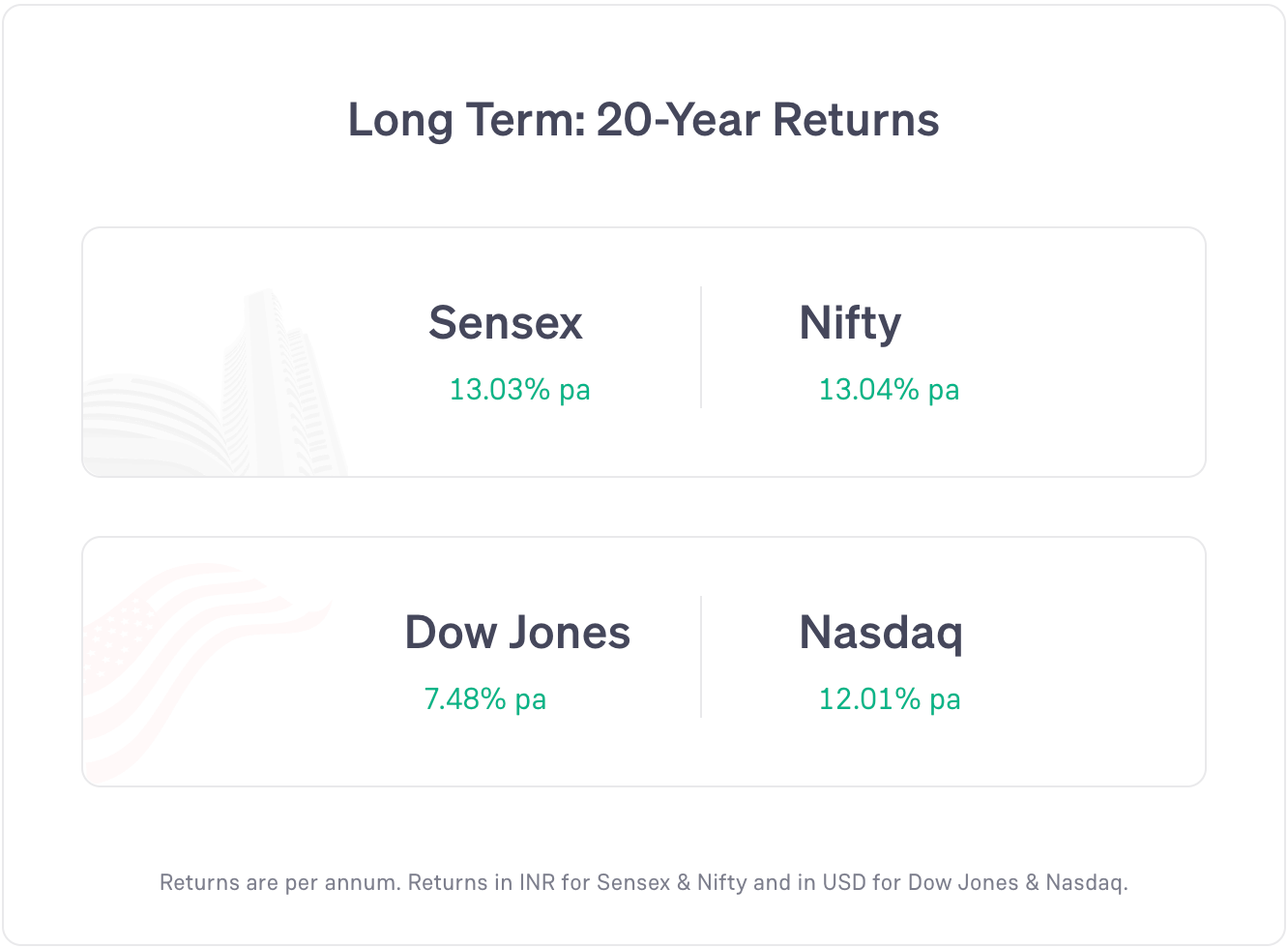Markets opened slightly below yesterday’s closing point.
Nifty 50 was volatile and stayed in a range. It fell sharply in the last hour and closed in red.
FMCG stocks and consumer durables stocks rose the most today. Realty stocks and metal stocks fell the most.
Global markets: Most US markets and Asian markets closed in red. European markets rose.
News
Starlink received approval from India's space regulator, IN-SPACe, to operate commercial satellite broadband services in the country. The company can now proceed to get further approvals and buy spectrum from the government.
Equity mutual funds saw a net inflow of Rs 23,587 crore in June (vs Rs 19,013 crore in May). Debt mutual funds saw a net outflow of Rs 1,711 crore (vs Rs 15,908 crore in May). Total number of SIP accounts rose 2.3% annually to 9.19 crore (amounting to Rs 27,269 crore).
China’s annual inflation rate rose to a positive value of 0.1% in June, compared to -0.1% in May.
Crizac IPO got listed on the stock market at a 14.71% premium over its issue price.
Travel Food Services IPO was subscribed 2.88 times. Retail subscription: 0.69 times. Closed for subscription.
Stocks Updates
ICICI Bank: company subsidiary, ICICI Prudential AMC, filed draft papers with SEBI for an IPO (entirely an offer-for-sale). ICICI may also buy up to 2% additional shares before the IPO to maintain majority holding.
Ambuja Cements: company subsidiary, ACC, commissioned a 1.5 MTPA grinding unit at Sindri, Jharkhand.
Asian Paints: sold its entire 4.42% stake in Akzo Nobel India (a paint manufacturing company) for around Rs 734 crore.
Lupin: partnered with Zentiva to commercialize its biosimilar Certolizumab Pegol. Lupin will develop and supply the product globally, commercializing it in the US and Canada, while Zentiva will handle markets across Europe and CIS.
Vedanta: dismissed the Viceroy Research report, which referred to the company as “unsustainable, operationally compromised, & resembles a Ponzi scheme.”
Airtel: partnered with Ericsson to deploy its core network for Fixed Wireless Access (FWA) in India. FWA is used to provide high-speed internet at fixed locations without traditional fiber or cables. The company also formed a financial services subsidiary, Airtel Money.
Bajaj Auto: company subsidiary, Bajaj Auto Credit, issued Rs 490 crore worth commercial paper at 6.35% yield, maturing on 5 Dec.
NTPC: company subsidiary, THDC, declared commercial operation of Unit II (250 MW) of its Tehri Pumped Storage Project.
Ashok Leyland: set 16 July as the record date for its 1:1 bonus share issue announced earlier.
Word of the Day
Benchmarking
It is a process of checking how good and efficient an asset is by comparing against a standard
In investing, benchmarking is usually used to compare a mutual fund or portfolio against an index like the Nifty 50 or Sensex.
Example: if a mutual fund gives 12% return and the index rises 10%, then the fund is doing better than the benchmark index.
This way investors can judge how well their fund is being managed.
6 Day Course
Theme: Warren Buffett’s checklist
Day 3: Wednesday
Next: price paid.
Warren Buffett does not invest in overpriced stocks. Or in other words, he does not invest in over-valued stocks.
His entire investing philosophy centres around value investing — which is he wants to buy stocks that are under-valued.
In his case, this often means he skips investing in good companies’ shares too if they are over-valued.
Warren Buffett is very clear that he does not depend only on PE ratio or any other such metric individually to determine if a company is fairly valued.
Instead, he determines the value of a company based on its future prospects and growth potential.
This is why he places a high degree of importance on understanding the company, operations, and the market carefully.
Based on this, he evaluates a company’s future potential.
Based on that future potential, he determines if the present share price is over-valued/under-valued/fairly-valued.
Featured Question
Q. “How does one find out if the management of a company are transparent and honest.”
Excellent question.
The answer to that is not easy — unfortunately.
How do you determine if a person is good or bad?
When it comes to people you do not have access to directly, this becomes more difficult.
How do you know if an actor, cricketer, politician, journalist, etc is transparent and honest?
There is no sure-shot way of telling but if you observe them long enough, you can get some idea.
Watching interviews, reading about them, seeing how they respond to questions, etc can give a sense of the person.
In case of stocks, we can observe the past record of companies and the management running them.
Are there any controversies involving the company? How did the management deal with it? Did they seem transparent in doing so?
What were the people in the management doing before they joined this company? How was their experience in that?
Who are other people they commonly associate themselves with?
All of these can give us an indication of the people running the company.
In addition to that, we have access to the company’s numbers to verify — we can look at the revenues, profits, debt, etc. to determine how transparent the management is being.
Attending a company’s annual shareholder meeting is another great opportunity to meet the management and maybe even ask questions. Usually, there is an option to attend the meeting online too.
Yet there is no way of determining if the management is 100% reliable. That is impossible even with people we know personally.
Did you like this edition?
Leave a feedback here!






